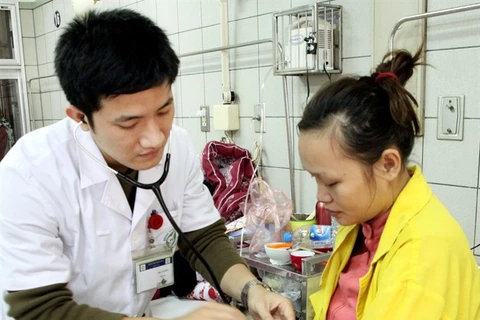 A child infected with Adenovirus is being treated in Hanoi-based National Children’s Hospital. (Photo: National Children’s Hospital)
A child infected with Adenovirus is being treated in Hanoi-based National Children’s Hospital. (Photo: National Children’s Hospital) According to the hospital’s statistics, from August 1 to September 12, the hospital recorded 412 children infected with Adenovirus, more than the total number of infections last year and up more than 44% compared to the same period in 2021.
Notably, since the beginning of the year, there have been six deaths of children infected with the virus.
In the week from September 5 to 11 alone, the hospital registered 151 new cases of the virus, an increase of nearly 2.2 times compared to the previous week.
According to Associated Prof. Dr. Le Thi Hong Hanh, director of the hospital’s Respiratory Centre, Adenovirus is divided into seven groups from A to G, of which there are more than 50 types causing diseases in many organs of the human body.
The most common illnesses caused by Adenovirus infection are upper and lower respiratory tract infections, eye conjunctivitis or pinkeye, gastrointestinal diseases including diarrhoea, vomiting and nausea, cystitis, encephalitis and meningitis, the doctor said.
The diseases caused by Adenovirus appear all year round but especially thrive at the time of seasons changing such as from spring to summer or autumn to winter.
Adenovirus is transmitted by droplets of respiratory transmission between people. The disease can also be transmitted through mucous membranes when swimming or contaminated water used in daily life, or transmitted when healthy people share personal items with sick people.
The incubation period is about eight to 12 days.
Adenovirus can cause illness in all ages, with children between the ages of six months and five years the most common.
In particular, subjects such as children, the elderly and people with chronic diseases often have a high risk of infection with this virus due to weak resistance.
“Adenovirus has the ability to spread quickly in the community and cause many dangerous complications if not treated promptly, such as respiratory failure, sepsis and multi-organ failure,” Hanh said.
“The diseases can also leave long-term complications, affecting the health of children including post-infectious bronchiolitis obliterans syndrome, bronchiectasis and pulmonary fibrosis," the doctor said.
Dr. Le Kien Ngai, head of the hospital’s Infection Prevention and Control Department, said that the hospital set up a surveillance system for infectious diseases many years ago.
“Therefore, right from the middle of August, we realised the trend of the number of patients coming to the hospital for examination and treatment caused by Adenovirus increased rapidly and was different from the usual practice,” said Ngai.
“There is currently no vaccine against the virus in Vietnam. Therefore, the best way to control the spread of the disease is early detection, vigilance with clinical and epidemiological factors so as not to miss testing as well as adhere to routine preventive measures and comply with vaccinations for related diseases,” the doctor recommended.
Children infected with Adenovirus often have symptoms such as high fever, cough, and wheezing, which may be accompanied by conjunctivitis and digestive disorders. Children with severe symptoms will have difficulty breathing.
Children with suspected symptoms will be tested to support the diagnosis with blood tests, chest X-rays, and tests to determine the cause with Real-time PCR method.
The test is performed on patient samples taken from respiratory fluid to determine the virus and virus type. The results are 95-99% accurate, the doctor said.
Meanwhile, paediatrician Nguyen Trong An said that pneumonia or a respiratory tract infection caused by Adenovirus is an acute illness.
Symptoms of Adenovirus pneumonia are easily confused with other respiratory viral pneumonia, usually in children six months to five years old.
Symptoms are likely to turn severe in children who are malnourished, children with poor health conditions or have other underlying diseases.
Older children are less common and nearly 100% of adults have antibodies specific to many types of the virus, the doctor said.
In healthy children, with good nutrition, the disease can go away on its own, but in patients with underlying diseases or poor resistance, it can cause respiratory failure.
Therefore, parents must bring children to health care establishments immediately if the children get high fever, have difficulty breathing, rapid breathing, vomiting, chest tightness or signs of fatigue, warned the doctor.
“It is necessary to disseminate information about the virus to increase awareness for people to prevent virus from spreading out and protect children's safety,” said the doctor.
However, we should not exaggerate the danger of Adenovirus infection to avoid a wave of fear among the people, especially parents, he added./.
VNA























